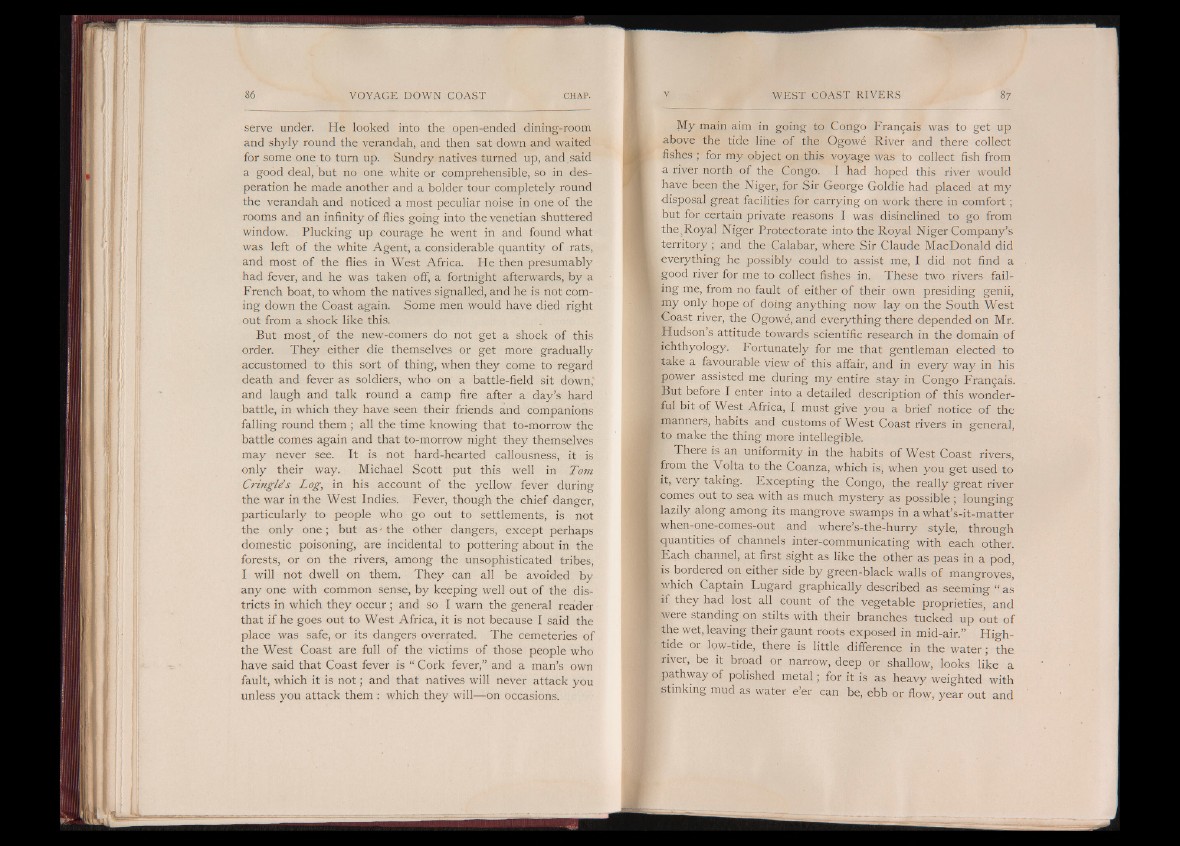
serve under. He looked into the open-ended dining-room
and shyly round the verandah, and then sat down and waited
for some one to turn up. Sundry natives turned up, and ,said
a good deal, but no one white or comprehensible, so in desperation
he made another and a bolder tour completely round
the verandah and noticed a most peculiar noise in one of the
rooms and an infinity of flies going into the Venetian shuttered
window. Plucking up courage he went in and found what
was left of the white Agent, a considerable quantity of rats,
and most of the flies in West Africa. He then presumably
had fever, and he was taken off, a fortnight afterwards, by a
French boat, to whom the natives signalled, and he is not coming
down the Coast again. Some men would have died right
out from a shock like this.
But most, of the new-comers do not get a shock of this
order. They either die themselves or get more gradually
accustomed to this sort of thing, when they come to regard
death and fever as soldiers, who on a battle-field sit down,
and laugh and talk round a camp fire after a day’s hard
battle, in which they have seen their friends and companions
falling round them ; all the time knowing that to-morrow the
battle comes again and that to-morrow night they themselves
may never see. It is not hard-hearted callousness, it is
only their way. Michael Scott put this well in Tom
Cringle's Log, in his account of the yellow fever during
the war in the West Indies. Fever, though the chief danger,
particularly to people who go out to settlements, is not
the only one; but as - the other dangers, except perhaps
domestic poisoning, are incidental to pottering about in the
forests, or on the rivers, among the unsophisticated tribes,
I will not dwell on them. They can all be avoided by
any one with common sense, by keeping well out of the districts
in which they occur; and so I warn the general reader
that if he goes out to West Africa, it is not because I said the
place was safe, or its dangers overrated. The cemeteries of
the West Coast are full of the victims of those people who
have said that Coast fever is “ Cork fever,” and a man’s own
fault, which it is n o t; and that natives will never attack you
unless you attack them : which they will— on occasions.
My main aim in going to Congo Français was to get up
above the tide line of the Ogowé River and there collect
fishes ; for my object on this voyage was to collect fish from
a river north of the Congo. I had hoped this river would
have been the Niger, for Sir George Goldie had placed at my
disposal great facilities for carrying on work there in comfort ;
but for certain private reasons I was disinclined to go from
the 1 Royal Niger Protectorate into the Royal Niger Company’s
territory ; and the Calabar, where Sir Claude MacDonald did
everything he possibly could to assist me, I did not find a
good river for me to collect fishes in. These two rivers failing
me, from no fault of either of their own presiding genii,
my only hope of doing anything now lay on the South West
¡Coast river, the Ogowé, and everything there depended on Mr.
Hudson’s attitude towards scientific research in the domain of
ichthyology. Fortunately for me that gentleman elected to
take a favourable view of this affair, and in every way in his
power assisted me during my entire stay in Congo Français.
But before I enter into a detailed description of this wonderful
bit of West Africa, I must give you a brief notice of the
manners, habits and customs of West Coast rivers in general,
to make the thing more intellegible.
There is an uniformity in the habits of West Coast rivers,
from the Volta to the Coanza, which is, when you get used to
it, very taking. Excepting the Congo, the really great river
comes out to sea with as much mystery as possible ; lounging
lazily along among its mangrove swamps in a what’s-it-matter
when-one-comes-out and where’s-the-hurry style, through
quantities of channels inter-communicating with each other.
Each channel, at first sight as like the other as peas in a pod,
is bordered on either side by green-black walls of mangroves^
which Captain Lugard graphically described as seeming “ as
if they had lost all count of the vegetable proprieties, and
were standing on stilts with their branches tucked up out of
the wet, leaving their gaunt roots exposed in mid-air.” High-
tide or low-tide, there is little difference in the water ; the
river, be it broad or narrow, deep or shallow, looks like a
pathway of polished metal; for it is as heavy weighted with
stinking mud as water e’er can be, ebb or flow, year out and